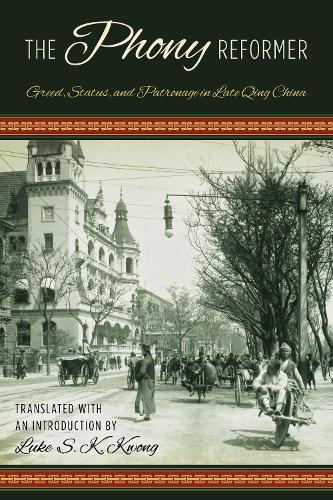
The Phony Reformer: Greed, Status, and Patronage in Late Qing China
(Paperback)
Available Formats
Publishing Details
The Phony Reformer: Greed, Status, and Patronage in Late Qing China
By (Author) Luke S. K. Kwong
Bloomsbury Publishing PLC
Rowman & Littlefield Publishers
15th June 2018
United States
Classifications
Tertiary Education
Fiction
Literary studies: fiction, novelists and prose writers
Literary studies: c 1900 to c 2000
895.1348
Physical Properties
Paperback
180
Width 152mm, Height 227mm, Spine 14mm
281g
Description
This engaging translation presents an authentic period document that reflects aspects of Chinese life and society as seen through contemporary eyes. Portraying a "phony" reformer who rode the tide of the Qing court's post-Boxer reform initiatives to career success and personal wealth, this satire conveys the author's hope for a new, improved China, one that could stand proudly alongside Western nations and Meiji Japan in the modern world. His vivid descriptions of various situations shed light on late Qing elite behavior and Chinese foreign relations capture the clash between tradition and modernity, the old and new, as educated Chinese stood at a cultural and political crossroads.
Reviews
An illuminating satire of bureaucratic reformers on the make in the post-Boxer late-Qing reform era. Serialized in 1905, this short novel chronicles the unlikely career climb of Yuan Bozhen, who time and again manages to make bad decisions and still land on his feet. The novel reads like a tongue-in-cheek how-to-succeed manual for low-level bureaucrats at the turn of the century. It concludes with a poem spelling out the moral of the story, like a big red bow on a box of candy. Luke Kwongs fluid translation is accompanied by an informative introduction and extensive annotations. With realistic ground-level details of officials interacting with each other, with foreigners, and with the Chinese citizenry, the novel makes an ideal supplement to any course on the late Qing or modern China. -- Paul Ropp, Clark University
I know of no other workfictional or otherwisethat captures so vividly and insightfully the motivations and machinations of Chinese elites as they sought to turn the dramatic political, social, and cultural changes of the early twentieth century to their own purposes. Luke Kwong knows this period better than anyone, and he has done a superlative job translating and annotating the novel, making the work not only accessible but also illuminating and absorbing. -- Richard J. Smith, Rice University
What did reform mean at the end of the Qing dynasty And how could one profit from it The Phony Reformer is a lively and engaging tale of an intrepid, if sometimesmorally dubious, scholar-official and his rise to prominence. How he successfully, fortuitously schemes his way from obscurity to power and profit opens our eyes to the complexity and intrigues of late Qing politics. This translation will be great for undergraduate Chinese history surveys as well as more specialized seminars on late imperial life, the civil service examination system, elite culture, and late imperial and twentieth-century Chinese fiction. -- Jia-Chen Fu, Emory University
Author Bio
Luke S. K. Kwong is professor emeritus of history at the University of Lethbridge, Alberta, Canada. His books include A Mosaic of the Hundred Days: Personalities, Politics, and Ideas of 1898 and Tan Ssu-tung, 18651898: Life and Thought of a Reformer.
